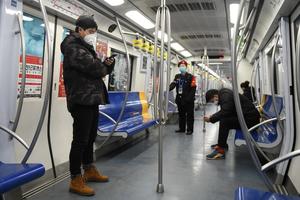 Commuters wearing face masks look at their mobile phones as they ride the subway in Beijing, Feb 13, 2020. (GREG BAKER / AFP)
Commuters wearing face masks look at their mobile phones as they ride the subway in Beijing, Feb 13, 2020. (GREG BAKER / AFP)
LONDON - The rise of “fake news” - including misinformation and inaccurate advice on social media - could make disease outbreaks such as the novel coronavirus epidemic currently spreading in China worse, according to research published on Friday.
In an analysis of how the spread of misinformation affects the spread of disease, scientists at Britain’s East Anglia University (UEA) said any successful efforts to stop people sharing fake news could help save lives.
Misinformation means that bad advice can circulate very quickly – and it can change human behavior to take greater risks.
Paul Hunter, Professor of medicine at the East Anglia University, Britain
“When it comes to COVID-19, there has been a lot of speculation, misinformation and fake news circulating on the internet – about how the virus originated, what causes it and how it is spread,” said Paul Hunter, a UEA professor of medicine who co-led the study.
COVID-19 is the formal name given by the World Health Organization of the disease caused by the novel coronavirus.
“Misinformation means that bad advice can circulate very quickly – and it can change human behavior to take greater risks,” he added.
ALSO READ: We-media shouldn't be a plague of false news
In their research, Hunter’s team focused on three other infectious diseases - flu, monkeypox and norovirus – but said their findings could also be useful for dealing with the COVID-19 coronavirus outbreak.
“Fake news is manufactured with no respect for accuracy, and is often based on conspiracy theories,” Hunter said.
For the studies - published on Friday in separate peer-reviewed journals - the researchers created theoretical simulations of outbreaks of norovirus, flu and monkeypox.
Their models took into account studies of real behavior, how different diseases are spread, incubation periods and recovery times, and the speed and frequency of social media posting and real-life information sharing.
READ MORE: As coronavirus misinformation spreads, Facebook removes posts
They also took into account how lower trust in authorities is linked to tendency to believe conspiracies, how people interact in “information bubbles” online, and the fact that “worryingly, people are more likely to share bad advice on social media than good advice from trusted sources,” Hunter said.
The researchers found that a 10 percent reduction in the amount of harmful advice being circulated has a mitigating impact on the severity of an outbreak, while making 20 percent of a population unable to share harmful advice has the same positive effect.


